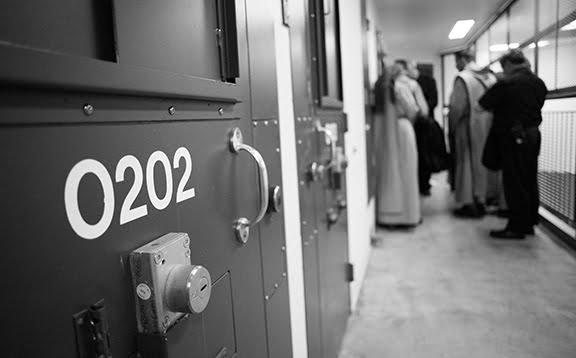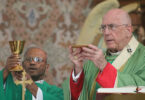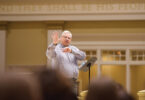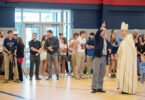 by Joe Bollig
by Joe Bollig
joe.bollig@theleaven.org
TOPEKA — In many ways, the teenage boys Archbishop Joseph F. Naumann visited here on Oct. 18 were like those he has met in other times and places.
But this time there were guards.
The boys, ages 13 to 16, wore the uniforms of the Topeka Juvenile Correctional Complex. They were inmates.
“I saw these young kids and I thought of the young people I confirm in our parishes and meet in our parish youth groups, and they look no different, except for the prison uniform,” said Archbishop Naumann.
But when he looked in their faces, they were different. He could see the trouble and pain in their eyes.
“It saddens me to think that, at such a young age, these young people seemed so confused and some were without a lot of hope,” he said.
Archbishop Naumann has seen it before. While he was in the seminary he and another seminarian, for their training, spent a summer at a home for troubled boys near Boston.
During his three months there, he got to know them quite well. Every boy had a sad story. Most came from dysfunctional families, but not all of them.
Some had, quite inexplicably, made very bad choices.
Archbishop Naumann had been invited to visit these boys by Father Joe Chontos, Catholic chaplain at the facility. The archbishop, accompanied by the Brothers and Sisters of the Community of the Lamb, held a prayer service, followed by a Q-and-A session, then made some individual visits.
With his cope and miter, Archbishop Naumann seemed a little exotic. So, too, did the Sisters and Brothers. Many of the boys were not Catholic.
“They asked whether the Sisters could marry, or I could marry,” said the archbishop.
“They asked if you had to be sinless to become a priest,” he continued. “And I said no, because we wouldn’t have any if that were the case. [I told them] we all need God’s mercy, and grace, and forgiveness in our lives.”
One boy asked the archbishop for advice on how he could pray better. Several asked the archbishop to pray for them, or with them. For the most part, they prayed for their families.
“Many of them prayed that they could be good, especially when they got out of there,” said the archbishop, “that they’d have the strength to do the right thing so they would not have to come back.”
Some boys were locked up in cells to isolate them from the general population. The archbishop visited and prayed with them, too.
Such a place — a prison for children — could be a picture of almost utter despair. Often, the boys are as much victims as perpetrators, and their issues are intractable.
In his visit, the archbishop lived one of those mysterious Christian paradoxes.
“I went there with a poverty, humanly speaking,” he said, “and I guess from the world’s point of view, there was very little I could do for them.
“My hope is that our being there and praying with them connected them with God and particularly with Jesus — to open their hearts to him. He can heal them if they are genuinely open to him.”
Even an archbishop cannot make their world right. He cannot reverse the damage or repair all hurts. He brought nothing, save for the greatest gift of all.
“All we had to bring, in a sense, was Jesus,” said Archbishop Naumann.






